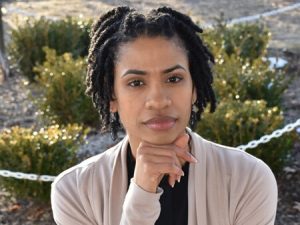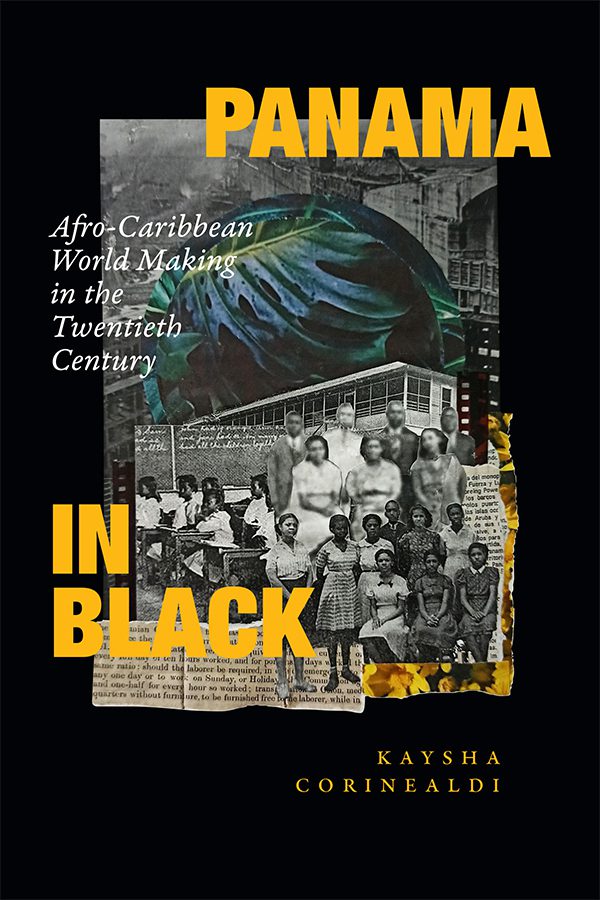Online Roundtable–Kaysha Corinealdi’s ‘Panama in Black’
May 29–June 2, 2023
Black Perspectives, the award-winning blog of the African American Intellectual History Society (AAIHS), is hosting a roundtable on Kaysha Corinealdi’s Panama In Black: Afro-Caribbean World Making in the Twentieth Century (Duke University Press, 2022). The roundtable begins on Monday, May 29, 2023 and concludes on Friday, June 2, 2023. It will feature pieces from Sharika D. Crawford (United States Naval Academy), Marcus Johnson (University of Maryland, College Park), Paul Joseph López Oro (Hunter College-CUNY), and Maya Doig-Acuña (Harvard University). At the conclusion of the roundtable, the author Kaysha Corinealdi (Emerson College) will respond.
During the week of the online roundtable, Black Perspectives will publish new blog posts every day at 5:30AM EST. Please follow Black Perspectives (@BlkPerspectives) and AAIHS (@AAIHS) on Twitter, like AAIHS on Facebook, or subscribe to our blog for updates. By subscribing to Black Perspectives, each new post will automatically be delivered to your inbox during the week of the roundtable.
About the Author
 Kaysha Corinealdi is a scholar of twentieth century histories of empire, migration, feminism, and Afro-diasporic activism in the Americas. She is also actively engaged in public scholarship, through works with museums, open access magazines and blogs, and podcasts. Corinealdi has presented her work nationally and internationally on themes such as photographing existence in the Americas, women undoing empire, anti-Blackness in the Americas, Afro-Latinx educators in New York City, and anti-communism in twentieth century Panama and the United States. She is the author of Panama in Black: Afro-Caribbean World Making in the Twentieth Century (Duke University Press, 2022), which centers the activism of Afro-Caribbean migrants and their descendants as they navigated practices and policies of anti-Blackness, xenophobia, denationalization, and white supremacy in Panama and the United States. Her writing can also be found in Signs: Journal of Women in Culture and Society, Public Books, Social Text, the American Historical Review, the Washington Post, the Caribbean Review of Gender Studies, the International Journal of Africana Studies, and the Global South.
Kaysha Corinealdi is a scholar of twentieth century histories of empire, migration, feminism, and Afro-diasporic activism in the Americas. She is also actively engaged in public scholarship, through works with museums, open access magazines and blogs, and podcasts. Corinealdi has presented her work nationally and internationally on themes such as photographing existence in the Americas, women undoing empire, anti-Blackness in the Americas, Afro-Latinx educators in New York City, and anti-communism in twentieth century Panama and the United States. She is the author of Panama in Black: Afro-Caribbean World Making in the Twentieth Century (Duke University Press, 2022), which centers the activism of Afro-Caribbean migrants and their descendants as they navigated practices and policies of anti-Blackness, xenophobia, denationalization, and white supremacy in Panama and the United States. Her writing can also be found in Signs: Journal of Women in Culture and Society, Public Books, Social Text, the American Historical Review, the Washington Post, the Caribbean Review of Gender Studies, the International Journal of Africana Studies, and the Global South.
About the Participants
 Sharika D. Crawford (@SharikaCrawfo17) is a Professor of history at the United States Naval Academy. Her scholarship has centered on African-descended peoples in Latin America and the circum-Caribbean. She is the author of The Last Turtlemen of the Caribbean: Waterscapes of Labor, Conservation, and Boundary Making (University of North Carolina Press, 2020). In 2021, her book received an honorable mention from the Elsa Goveia Book Prize Committee of the Association of Caribbean Historians. Her scholarly interests now focus on historical moments when African-descended peoples formed solidarities and communities. Currently, she is working on an article manuscript examining a group of Black American expats to Ghana during the Kwame Nkrumah era (1951-1966).
Sharika D. Crawford (@SharikaCrawfo17) is a Professor of history at the United States Naval Academy. Her scholarship has centered on African-descended peoples in Latin America and the circum-Caribbean. She is the author of The Last Turtlemen of the Caribbean: Waterscapes of Labor, Conservation, and Boundary Making (University of North Carolina Press, 2020). In 2021, her book received an honorable mention from the Elsa Goveia Book Prize Committee of the Association of Caribbean Historians. Her scholarly interests now focus on historical moments when African-descended peoples formed solidarities and communities. Currently, she is working on an article manuscript examining a group of Black American expats to Ghana during the Kwame Nkrumah era (1951-1966).
 Marcus Johnson is an assistant professor of Government and Politics at the University of Maryland, College Park. His work examines racial disparities in political behavior in democracies that are stratified by race. He is particularly interested in how historical and contemporary patterns of racial inequality affect the political behavior of people of African descent in Latin America. Marcus was awarded a Fulbright Research Award to conduct field research in Panamá in 2016. He earned his PhD from Princeton University in 2017.
Marcus Johnson is an assistant professor of Government and Politics at the University of Maryland, College Park. His work examines racial disparities in political behavior in democracies that are stratified by race. He is particularly interested in how historical and contemporary patterns of racial inequality affect the political behavior of people of African descent in Latin America. Marcus was awarded a Fulbright Research Award to conduct field research in Panamá in 2016. He earned his PhD from Princeton University in 2017.
 Paul Joseph López Oro, Ph.D. is a transdisciplinary scholar of Black Studies whose teaching and research lies at the intersections of multiple fields/conversations, such as Black Queer Diaspora Studies, Afro-Latin American/Afro-Latinx, Caribbean Studies, Women’s, Gender, & Sexuality Studies, and Native American & Indigenous Studies. Grounded in Black Queer Feminist methodologies and epistemologies he uses multi-sited archives, oral histories, film, social media, and critical ethnography to unearth the often understudied and undertheorized intellectual, political, spiritual, and cultural contributions embodied by Garifuna (Black Indigenous) women and queer-identified folks who are at the forefront of decades-long hemispheric movements of preserving Indigenous Blackness. His first book manuscript Indigenous Blackness: The Queer Politics of Self-Making Garifuna New York is a transdisciplinary ethnography on how gender and sexuality shape the ways in which transgenerational Garifuna New Yorkers of Central American descent negotiate, perform, and self-make their multiple subjectivities at the intersections of their: Blackness/Indigeneity/Central American Caribbean Latinidad.
Paul Joseph López Oro, Ph.D. is a transdisciplinary scholar of Black Studies whose teaching and research lies at the intersections of multiple fields/conversations, such as Black Queer Diaspora Studies, Afro-Latin American/Afro-Latinx, Caribbean Studies, Women’s, Gender, & Sexuality Studies, and Native American & Indigenous Studies. Grounded in Black Queer Feminist methodologies and epistemologies he uses multi-sited archives, oral histories, film, social media, and critical ethnography to unearth the often understudied and undertheorized intellectual, political, spiritual, and cultural contributions embodied by Garifuna (Black Indigenous) women and queer-identified folks who are at the forefront of decades-long hemispheric movements of preserving Indigenous Blackness. His first book manuscript Indigenous Blackness: The Queer Politics of Self-Making Garifuna New York is a transdisciplinary ethnography on how gender and sexuality shape the ways in which transgenerational Garifuna New Yorkers of Central American descent negotiate, perform, and self-make their multiple subjectivities at the intersections of their: Blackness/Indigeneity/Central American Caribbean Latinidad.
 Maya Doig-Acuña is a writer and PhD candidate in African & African American Studies at Harvard University. Her research interests include Black diaspora formation, family history, migration, and memory in the Circum-Caribbean world. Her dissertation draws on Black feminist methods to examine how Afro-Caribbean commemorative practice between Panama and New York illuminates the quotidian, affective, and gendered dimensions of 20th century Black diaspora-making. Their essay, “The Most Caribbean of Stories,” was selected as one of Southern Cultures Journal’s Top Ten of 2021. You can find her other published work in Remezcla, Guernica Magazine, Lampblack Magazine, and elsewhere. Maya is a born-and-raised Brooklynite, though she currently lives in the Boston area.
Maya Doig-Acuña is a writer and PhD candidate in African & African American Studies at Harvard University. Her research interests include Black diaspora formation, family history, migration, and memory in the Circum-Caribbean world. Her dissertation draws on Black feminist methods to examine how Afro-Caribbean commemorative practice between Panama and New York illuminates the quotidian, affective, and gendered dimensions of 20th century Black diaspora-making. Their essay, “The Most Caribbean of Stories,” was selected as one of Southern Cultures Journal’s Top Ten of 2021. You can find her other published work in Remezcla, Guernica Magazine, Lampblack Magazine, and elsewhere. Maya is a born-and-raised Brooklynite, though she currently lives in the Boston area.

